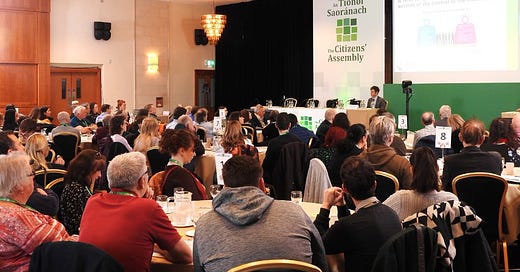What just happened in Ireland? Plus Claudia Chwalisz in conversation with Lawrence Lessig
The "Irish model" is being stress-tested in realtime — we welcome a conversation about the results
Last month, voters rejected constitutional change in Ireland on family and care, prompting an ongoing debate about the future of Citizens’ Assemblies there. But should the results call into question the “Irish model,” which incorporates Citizens’ Assemblies as the “fourth leg” of democracy?
Let’s review what happened. On March 8, 67% of Irish voters rejected an amendment to the Irish constitution to change the definition of family, while 74% rejected an amendment regarding care. The referendums came after a Citizens’ Assembly deliberated on precisely those subjects. The Assembly, composed of 99 randomly-selected Irish citizens, met online (rather than in person, due to the COVID pandemic) from 2020 to 2021.
However, the language placed on the ballot was significantly weakened in tone and scope compared with the Assembly’s recommendations, and was arguably less straightforward, as Irish Chief Executive of the Electoral Commission Art O’Leary explained in a recent DemocracyNext interview:
We had an Assembly which dealt with the huge spectrum of issues around gender equality. Our constitution, which was written in 1937, says a family is based on what might have been the societal norm back in 1937: a man married to a woman, probably with many children. The family was based on marriage.
The proposal here is that we would put the words “and other durable relationships” along with married people. The second referendum is about something a little more controversial. You may have heard of the famous women in the home clause, which exists in the Irish constitution. It says women who mind children and perform home duties shouldn’t have to go to work, because they make a contribution to the public good by staying at home.
Now that clause could be deleted. It would be replaced with another article, which says anybody in a family who is providing care at home should be acknowledged; that they provided a contribution to the public good; and that the government will try its hardest to make sure that they don't have to go to work to the detriment of their care responsibilities at home.
There is some controversy around this. The Citizens’ Assembly made a much stronger recommendation, to oblige the government to support people with caring responsibilities. The language being proposed doesn't go as far as a legal obligation. It's less than that.
(To compare the exact changes between the recommendations from the Assembly and what was placed in the referendum, have a look at the Sortition Foundation’s explainer.)
The fallout from the referendum vote has been significant. The results marked a setback for the ruling Fine Gael party and may have been a contributing factor to the resignation of Taoiseach Leo Varadkar on March 24.
There’s debate among Irish academics too. In the Irish Independent, Dublin City University politics professor Eoin O’Malley argued the referendum results show the Assembly itself was out-of-touch with the Irish public. He argues more power should be shifted to the Irish parliament to deal with these matters.
University College Dublin professor David Farrell disagreed, saying the Assembly had done its job, but the government largely ignored its recommendations instead of making use of them, as it did in the case of abortion. Farrell called for more transparency during the crucial stage where government officials have received an Assembly’s recommendations and are deciding what to put to referendum.
Our own Founder/CEO Claudia Chwalisz weighed in:
I agree almost entirely with David's analysis.
We often look to Ireland as a beacon for change, with previous Citizens' Assemblies leading to four successful referendums on constitutional change. Yet David is right that there is still a lot of deliberation being ignored by the government with no good reason.
I disagree that: "Cleary, no government should be expected to simply accept an Assembly's recommendation. "Why not? Assembly after Assembly around the world has shown us that people develop thoughtful, complex, reasoned, and ambitious proposals after weighing evidence and deliberating together. Their recommendations are robust and are developed across political divides, often reaching 80%+ levels of consensus.
The problem is not with Citizens' Assemblies. The problem is when an Assembly's recommendations make their way back into the electoral system, where party politics and campaign logics come back into the picture.
The time has come for decision-making Citizens' Assemblies. We need to shift *who* decides and *how* decisions are taken if we want to get to another kind of politics and democracy. I know I do.
We believe it’s important to be opening up the space for this conversation about the future of the Irish model and whether Citizens’ Assemblies should have decision-making authority.
We’re in a historical period where many can agree that the current political system is in need of renovations, but there’s not yet a broad consensus on what those renovations should be. There are many permutations of how Assemblies can connect to other parts of the political system — those various configurations are in what we might call a stress-testing phase in Ireland and around the world. Progress is highly unlikely to be linear.
There’s no one right answer to these questions, including within our own organisation. While Claudia has her own view about giving Assemblies greater decision-making power, our Advisory Council Member, President of the Irish Electoral Commission Art O’Leary, said he disagrees with her in our recent interview with him. It may be unusual to hear this from a political non-profit, but disagreement is okay—welcome, even.
In the spirit of living the values that we promote, we believe curiosity and uncertainty are vital characteristics of a healthy democratic space. We share a commitment to enabling a more just, joyful, and collaborative future where everyone has meaningful power to shape their societies, and we believe in the need for the principles of sortition, deliberation, and participation. We examine evidence and collaborate with others to learn and iterate for the future.
When it comes to deliberation within Assemblies, many of the best practices have been firmly established by research.
As for what happens after an Assembly completes its work, we lean toward the view that Assemblies should have more power rather than less. But what form this takes is still very much up for debate, conversation, and exchange—which, we believe, will be an enriching and useful experience for all of us. We remain open to listening to each other’s reasoning and arguments, exploring ideas in the search for understanding, and being open to changing our minds.
We are curious to hear what you think about this, so please sound off in the comments!
🎧🇺🇸 New podcast alert! Claudia joined Harvard Professor Lawrence Lessig’s podcast for a 50 minute discussion about democratic innovation. Lessig’s reflections on the state of play in the United States may be of particular interest for American readers.
📆 Upcoming events:
For our French readers, today (April 4), at Open Source Politics in Paris: “Claudia Chwalisz, fondatrice et PDG de DemocracyNext, et Louise Guillot, conseillère en transformation publique à la Ville de Marseille, explorons pour nous les démarches novatrices d’engagement citoyen dans lesquelles elles sont impliquées aux niveaux global et local.”
Next Monday April 8 17:00 CET , join a webinar exploring how museums can become more democratic and relevant by welcoming Citizens’ Assemblies. Organised by Acesso Cultura, details here.
Also on April 8, Claudia will speak at Demos in London. Info below:







Democracy using sortition needs decision-making power. But it is not so simple as having a citizens' assembly proposal being enacted. There is always a risk that any group, even with good deliberative process, may go "off track" due to groupthink, information cascades, corruption, or deferral to a uniquely influential member. So, every citizens' assembly proposal needs a check and balance. But letting politicians do that is very bad process (as it undoes the benefit of non-partisan deliberation). Ideally, a second much larger (perhaps 1,000) random sample jury would hear testimony about the proposal, hear pro and con arguments from a wide range of experts, and vote. That would be well-informed, non-tribalism democracy.
I fully agree with Claudia. Citizens’ Assemblies only make sense if they are able to DECIDE, not if they return their results to the parliaments who follow their proper logic of power by trying to be (re-)elected by any means (#PowerApriori: winning elections is the a priori of power in democracies, so it always comes first, rest: second, third…). The logic of citizens assemblies is completely different: without any need to please some interest groups, deliberation results in wise decisions—unless decisions are taken away from them under the pretext of “legitimacy”.